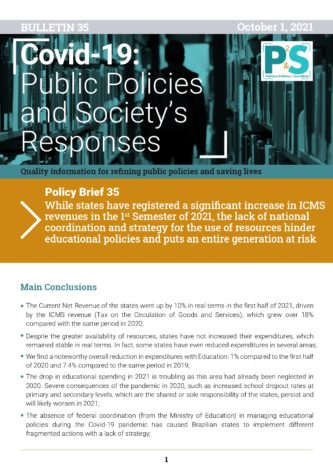Main conclusions
- The Current Net Revenue of the states went up by 10% in real terms in the first half of 2021, driven by the ICMS revenue (Tax on the Circulation of Goods and Services), which grew over 18% compared with the same period in 2020;
- Despite the greater availability of resources, states have not increased their expenditures, which remained stable in real terms. In fact, some states have even reduced expenditures in several areas;
- The drop in educational spending in 2021 is troubling as this area had already been neglected in 2020. Severe consequences of the pandemic in 2020, such as increased school dropout rates at primary and secondary levels, which are the shared or sole responsibility of the states, persist and will likely worsen in 2021;
- The absence of federal coordination (from the Ministry of Education) in managing educational policies during the Covid-19 pandemic has caused Brazilian states to implement different fragmented actions with a lack of strategy;
- The federal ban on increased spending on wages and other benefits until December 2021, imposed by Complementary Law 173/2020, further limited the use of budget resources for education, which are highly concentrated on expenditures with personnel. However, the demand for investments in school infrastructure and technology, in addition to contracting services that could minimize damage caused by the suspension of in-person activities, does not seem to have been adequately met. The available data does not show a substantial use of resources for these expenditures;
- Some states have announced expenditure plans by way of direct transfers to schools as well as municipalities (such as the PDDE in the state of São Paulo). However, this spending volume is lower than registered in previous years, such as 2019;
- A common complaint among state managers concerns the difficulties in public bidding/acquisitions to address education problems within this period. However, our survey shows that most states were covered by public calamity decrees that could have streamlined such hirings and acquisitions;
- It is essential to understand the difficulties in education policy and management at this critical moment, since resources exist and education is bound to mandatory tax revenue transfers. All estimates suggest a severe worsening of educational inequalities in Brazil (already extremely severe), and failure to enact swift measures may put an entire generation at risk.
Authors
- Ursula Dias Peres (Prof. EACH/USP and Researcher CEM/USP)
- Fábio Pereira dos Santos (CMSP and Assistant Researcher CEM/USP)


